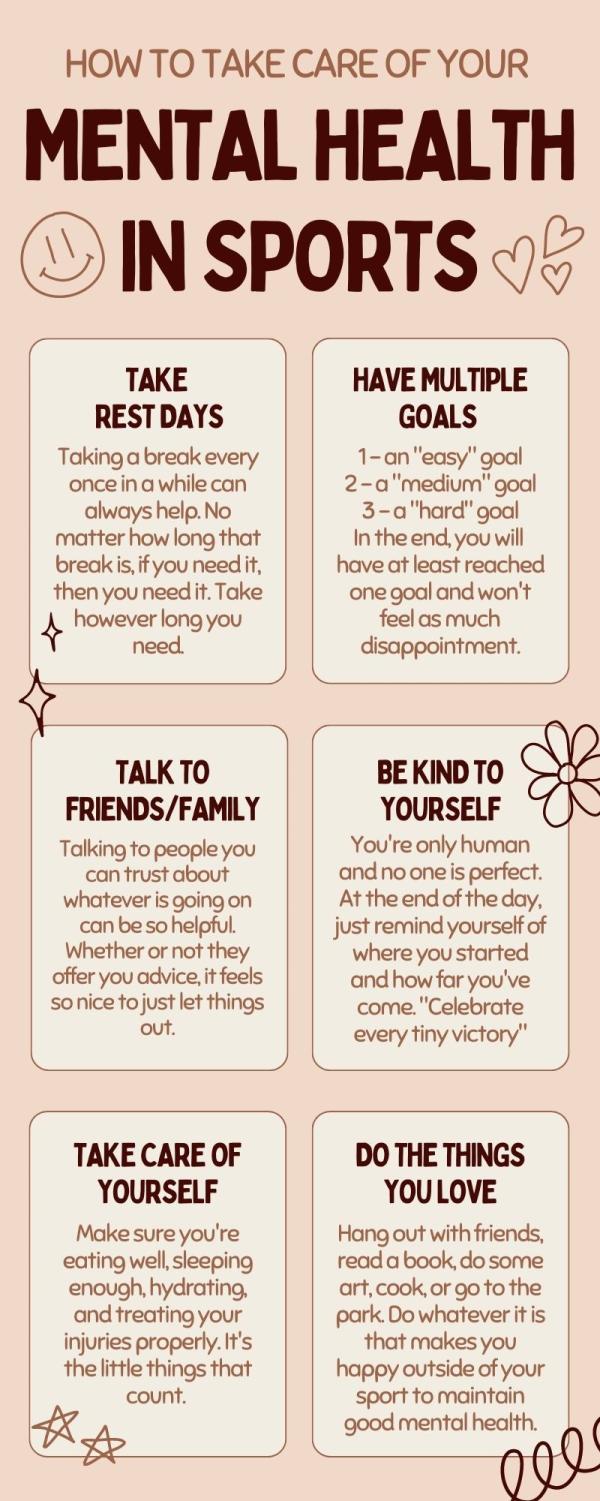Mental health in sports
Not All Fun and Games
November 3, 2022
High school sports are often seen as fun after-school activities, but what many people don’t see is the student-athletes that suffer from emotional stress and adverse mental health in and out of school as a result of their sport.
Sports consume most of the students’ after-school schedules, which leaves them with little time for other aspects of their life. Football player Justin Botelho (11) mentions that his sport strains his mental health because practices and games leave him with no time to do homework.

“I stay up late doing work and stressing about whether or not I can do it on time,” Botelho says. “Lots of stress caused me to act differently, like more sad and not myself because all I can think about is doing my work and it on time.”
High school sports are highly competitive, focusing on winning against other schools. Blayze Kouchi (11) explains that sports like wrestling can put a lot of pressure on athletes.
“This is because when you’re wrestling there is only you and one other person on the mat, which means you can’t rely on anyone but yourself to win,” Kouchi says.
The pressure to succeed is a weight on most athletes’ shoulders. Cross country and track and field runner Kacey Miura (12) adds pushing yourself to win causes stress and pressure. While that can be “positive towards motivation and attaining goals,” it also puts a strain on an athlete’s mental health.
“Sports is a challenge of who is the best and can cause people to overly strive to be the best all the time,” Miura says. “And if they are not, they will feel as if they are no good and should quit. Having pressure put on you will also make you want to do good which can lead to hefty amounts of stress that can harm outside factors other than sports in your life.”
Loss can also impact an athlete’s mental health.
“[It] can affect your mental health negatively because it can shake your confidence by losing,” Kouchi says. “If you lose a lot of matches, your confidence will be broken, and you will start to have a failure or losing mindset.”
Many athletes that do high school sports have been doing that sport for a long time, so that sport is a big part of their lives. Over time their feelings of confidence can depend on how competitions turnout. Ashlyn Sera (10) has been playing softball since she was young, so she explains that she links her self-worth with her performance.
“So when I do poorly on the field, I feel bad about myself like I can’t do anything right, and I’m not good enough to play at all,” Sera says.
Trying a new sport can also be challenging for an athlete’s mental health. *Nick explains how learning Jiu Jitsu was hard on his well-being because it was his first time doing a sport, and he’d never experienced that level of competition and intensity of workouts.

“During the summer, I started Jiu-Jitsu, and I only knew the basics, and so when I started the classes, it was mentally straining because there were many things I didn’t know,” he says. “For example, I didn’t understand Japanese, and all techniques and tests were in Japanese so day-after-day it got so strenuous I used to lie about practice days to my parents. It was also very physically straining because, after practices, I used to get beat down physically and mentally by the guys in my class.”
Doing sports in high school sometimes leads to a decline in performance. Swimmer Latasha Hui (10) states that after her practices, she doesn’t have enough energy to do school work which puts her in a cycle of declining motivation for school and swimming.
“The stress of school and the stress of doing sports is overwhelming, and it can sometimes make me feel like I’m not going anywhere and makes me lose my confidence because I don’t have the motivation or the energy,” Hui says.
Cross country and track and field runner Sophia Kyriakakis (10) adds that her sport, cross country, is a very highly intensive sport that requires lots of energy. Sports like that can affect people’s physical health, eventually leading to their mental health declining because it requires a lot of energy from students, so they don’t have time to focus on themselves.
“Personally, I am currently struggling with mental health and sports adding onto it is probably making it a lot worse since a lot of my focus is going towards my sport,” Kyriakakis says.
Coach Racer has been coaching wrestling for 14 years and has experience helping athletes whose emotional well-being was challenged because of not making weight and “suffering a heartbreaking loss.” He prioritizes mental health because wrestling can be such an intense one-on-one sport.
“I definitely think mental health should be addressed in sports,” Coach Racer says. “How it can be a positive outlet for people that struggle with mental health, but it can also perpetuate some negative thoughts as well.”
Sports can cause many problems that could be hard for someone to handle on their own, so it’s important to remember you’re not alone. If you’re comfortable, talking with your coaches, teammates, and even your parents is beneficial. Sports are a big part of our lives but remember to have fun and not let it ruin your perception of yourself.
*Name changed to protect their identity.
Mental Health Awareness References:
Johnson, Greg. “Mental Health Issues Remain on Minds of Student-Athletes.” NCAA.org, 24 May 2022, www.ncaa.org/news/2022/5/24/media-center-mental-health-issues-remain-on-minds-of-student-athletes.aspx.
LMFT, Samantha Bothwell. “What Athletes Are Most Likely to Have an Eating Disorder.” Eating Disorder Hope, 20 Dec. 2021, www.eatingdisorderhope.com/blog/what-athletes-are-most-likely-to-have-an-eating-disorder.
“Mental Health.” NATA, www.nata.org/taxonomy/term/153. Accessed 24 Oct. 2022.
Sacco, Matthew. “Athletes and Mental Health: Breaking the Stigma.” Cleveland Clinic, 10 Aug. 2021, health.clevelandclinic.org/mental-health-in-athletes/.
“Stress and Youth Sports | Ohio University.” Ohio University, 21 Mar. 2018, onlinemasters.ohio.edu/blog/stress-and-school-sports/.
How to Take Care of Your Mental Health References
“5 Tips for Athletes to Stay on Top of Their Mental Health.” Rogers Behavioral Health, rogersbh.org/about-us/
“Athletes’ Mental Health: How to Overcome the Pressure of Competition.” Www.henryford.com, www.henryford.com/blog/2021/
CENTER, KY COUNSELING. “The Importance of Mental Health for Athletes.” Kentucky Counseling Center, 18 May 2021, kentuckycounselingcenter.com/













